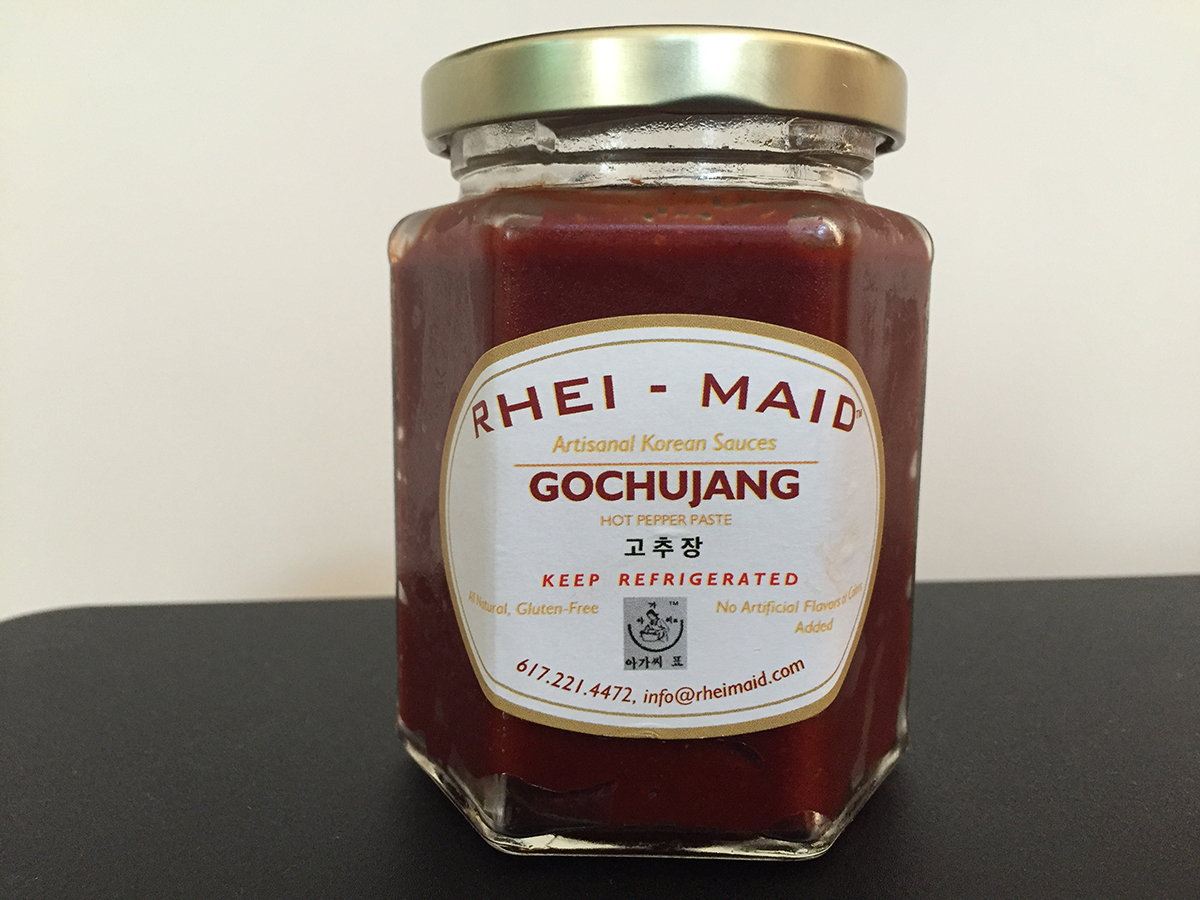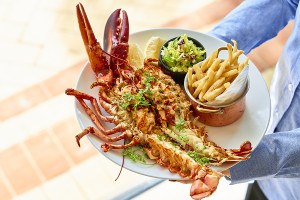Rhei-Maid Gochujang Is Boston Chefs’ Secret Ingredient

Rhei-Maid gochujang, a secret ingredient of many Boston and New York City chefs, is coming to Foodie’s Market in the South End. / Photo provided
Gochujang might not sound like a very familiar ingredient to you, but if you’ve eaten at Townsman, Myers + Chang, Toro, Asta, or many other Boston-area hot spots, you’ve likely enjoyed the depth of flavor and umami that this fermented, Korean-style hot sauce adds to a dish.
That’s because Mary Rhei, president of Rhei-Maid and a longtime Boston-area resident, literally went door-to-door with samples of her family’s traditionally made products, convincing many of Boston’s most well-known chefs to use them, whether they offer Korean-inspired menu items or not. At Townsman, for example, pastry chef Meghan Thompson adds Rhei-Made doenjang, a soybean paste, to her classic Boston brown bread.
Gochujang, doenjang, and ganjang, a fermented soy sauce, are traditional accompaniments Korean families typically made themselves at home, Rhei says. Her parents started to commercially produce their sauces—using Rhei’s mother’s grandmother’s recipe—more than 50 years ago in the kitchen of a grocery store they owned in Paterson, N.J. They soon began labeling it Rhei-Maid, and over the years, they expanded production into a few commercial kitchens across New Jersey to keep up with wholesale demand.
Rhei recalls telling her parents as early as the 1980s that Western palates were becoming more diverse and the family could probably find a market for their condiments beyond the Korean community, but it wasn’t until recent years, when Rhei took over more of the day-to-day operations, that Rhei-Maid started to become a well-known brand among Boston and New York chefs.
Rhei, formerly a Wall Street analyst and day-trader, left that line of work about two years ago to care for her ailing father. She began stopping by city restaurants with samples of Rhei-Maid products while traveling between Boston and New Jersey. Rhei’s father passed away about two years ago, and her mother is slowing down at 85, so Rhei stepped in at Rhei-Made, with a lot of help from her sister-in-law, and a tennis partner-turned-director of sales, Robert Goodwill.
Beginning August 24, Rhei-Maid’s gochujang will have retail availability for the first time, thanks to an exclusive deal with Foodie’s Market in the South End. The store will carry eight-ounce jars of the fermented chili pepper paste, and it will also sell chicken breasts marinated in a gochujang glaze in the prepared foods section.
Now, Rhei is looking to move her company to the Boston area, and she’s in talks with a developer of a site 30 minutes outside Boston—she declines to specify where at this time, because it is still pending—where Rhei-Made can headquarter and grow its production.
“We’re very positive that things will pan out, but it does take time to make sure everything is in line with our needs,” Rhei says.
There are some specific concerns, too: Remember the nuisance complaint against the California manufacturer of Sriracha chile sauce and its spicy air pollution? Rhei-Maid could face the same problem. “We need more of a remote space because the factory for the fermented products does release a pungent odor, and for gochujang, it’s a spicy odor,” Rhei says. “We want to make sure we get everything in order and done properly.”
Gochujang, an essential ingredient in Korean dishes like bulgogi and doekbokki, is made from red chili peppers and soybeans. Even if home cooks have picked up a jar of gochujang before, Rhei is willing to bet her great-grandmother’s recipe is better. Many commercialized gochujang brands hit the market after an expedited fermentation process, but all of Rhei-Maid’s products are allowed to naturally ferment for at least six months. They are naturally gluten-free, and do not contain any high-fructose corn syrup.
“I’ve been using Mary’s product for years, in sauces, [and] as a marinade,” Myers + Chang chef Karen Akunowicz says. “The flavor is incomparable. I love that Rhei-Maid is a family business and that Mary took over and is modernizing, and growing what her family started.”
A promotional video produced for Rhei-Maid includes testimonials from Jamie Bissonnette (Toro, Coppa, Little Donkey), Matthew Gaudet (West Bridge, SuperFine Food), Asta chef Alex Crabb, and Mystic, Conn. chef James Wayman.
“It’s the perfect balance of sweetness, acidity, brightness, and spice we love from a real classic example of gochujang,” Townsman’s Jennings says in the video. It has funk, sweetness, and soul, adds chef Bryce Shuman of the Michelin-starred Betony in New York City.
Rhei is looking forward to introducing her traditional gochujang to a wider Boston-area audience with the Foodie’s launch.
“My main impetus is the fact that I really want to share these flavors with the world,” she says.
Follow Rhei-Maid on social media for other opportunities to try the gochujang, as well as for updates on the Boston-area factory.
Rhei-Maid tasting at Foodie’s Market, Wednesday, August 24 + Thursday, August 25, 5-7 p.m., 1421 Washington St., South End, Boston, 617-266-9911, foodiesmarkets.com.


